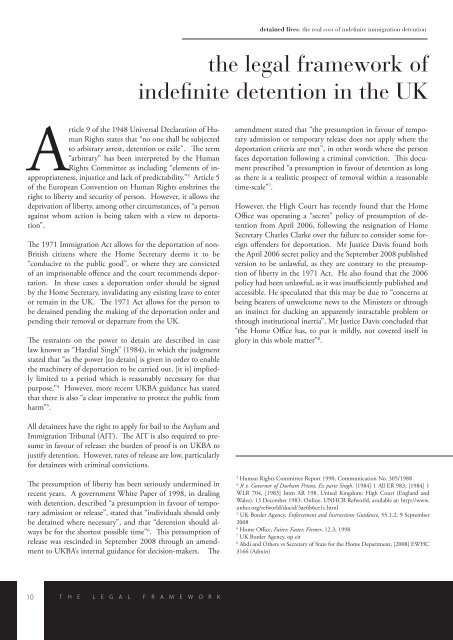Detained-Lives-report1
Detained-Lives-report1
Detained-Lives-report1
Create successful ePaper yourself
Turn your PDF publications into a flip-book with our unique Google optimized e-Paper software.
detained lives: the real cost of indefinite immigration detention<br />
the legal framework of<br />
indefinite detention in the UK<br />
Article 9 of the 1948 Universal Declaration of Human<br />
Rights states that “no one shall be subjected<br />
to arbitrary arrest, detention or exile”. The term<br />
“arbitrary” has been interpreted by the Human<br />
Rights Committee as including “elements of inappropriateness,<br />
injustice and lack of predictability.” 3 Article 5<br />
of the European Convention on Human Rights enshrines the<br />
right to liberty and security of person. However, it allows the<br />
deprivation of liberty, among other circumstances, of “a person<br />
against whom action is being taken with a view to deportation”.<br />
The 1971 Immigration Act allows for the deportation of non-<br />
British citizens where the Home Secretary deems it to be<br />
“conducive to the public good”, or where they are convicted<br />
of an imprisonable offence and the court recommends deportation.<br />
In these cases a deportation order should be signed<br />
by the Home Secretary, invalidating any existing leave to enter<br />
or remain in the UK. The 1971 Act allows for the person to<br />
be detained pending the making of the deportation order and<br />
pending their removal or departure from the UK.<br />
The restraints on the power to detain are described in case<br />
law known as “Hardial Singh” (1984), in which the judgment<br />
stated that “as the power [to detain] is given in order to enable<br />
the machinery of deportation to be carried out, [it is] impliedly<br />
limited to a period which is reasonably necessary for that<br />
purpose.” 4 However, more recent UKBA guidance has stated<br />
that there is also “a clear imperative to protect the public from<br />
harm” 5 .<br />
amendment stated that “the presumption in favour of temporary<br />
admission or temporary release does not apply where the<br />
deportation criteria are met”, in other words where the person<br />
faces deportation following a criminal conviction. This document<br />
prescribed “a presumption in favour of detention as long<br />
as there is a realistic prospect of removal within a reasonable<br />
time-scale” 7 .<br />
However, the High Court has recently found that the Home<br />
Office was operating a “secret” policy of presumption of detention<br />
from April 2006, following the resignation of Home<br />
Secretary Charles Clarke over the failure to consider some foreign<br />
offenders for deportation. Mr Justice Davis found both<br />
the April 2006 secret policy and the September 2008 published<br />
version to be unlawful, as they are contrary to the presumption<br />
of liberty in the 1971 Act. He also found that the 2006<br />
policy had been unlawful, as it was insufficiently published and<br />
accessible. He speculated that this may be due to “concerns at<br />
being bearers of unwelcome news to the Ministers or through<br />
an instinct for ducking an apparently intractable problem or<br />
through institutional inertia”, Mr Justice Davis concluded that<br />
“the Home Office has, to put it mildly, not covered itself in<br />
glory in this whole matter” 8 .<br />
All detainees have the right to apply for bail to the Asylum and<br />
Immigration Tribunal (AIT). The AIT is also required to presume<br />
in favour of release: the burden of proof is on UKBA to<br />
justify detention. However, rates of release are low, particularly<br />
for detainees with criminal convictions.<br />
The presumption of liberty has been seriously undermined in<br />
recent years. A government White Paper of 1998, in dealing<br />
with detention, described “a presumption in favour of temporary<br />
admission or release”, stated that “individuals should only<br />
be detained where necessary”, and that “detention should always<br />
be for the shortest possible time” 6 . This presumption of<br />
release was rescinded in September 2008 through an amendment<br />
to UKBA’s internal guidance for decision-makers. The<br />
3<br />
Human Rights Committee Report 1990, Communication No. 305/1988<br />
4<br />
R v. Governor of Durham Prison, Ex parte Singh. [1984] 1 All ER 983, [1984] 1<br />
WLR 704, [1983] Imm AR 198. United Kingdom: High Court (England and<br />
Wales). 13 December 1983. Online. UNHCR Refworld, available at: http://www.<br />
unhcr.org/refworld/docid/3ae6b6ce1c.html<br />
5<br />
UK Border Agency, Enforcement and Instructions Guidance, 55.1.2, 9 September<br />
2008<br />
6<br />
Home Office, Fairer, Faster, Firmer, 12.3, 1998<br />
7<br />
UK Border Agency, op cit<br />
8<br />
Abdi and Others vs Secretary of State for the Home Department, [2008] EWHC<br />
3166 (Admin)<br />
10<br />
t h e l e g a l f r a m e w o r k


